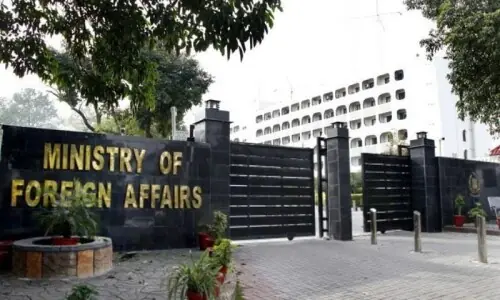
ISLAMABAD: The federal cabinet approved on Tuesday the devolution of seven ministries to the provinces, completing the process two days before the deadline under the 18th Amendment adopted by parliament in April last year.
As proposed by the implementation commission, the functions and staff of the ministries of food and agriculture, sports, women development, minorities’ affairs, labour and manpower, environment and health, with certain exceptions, will be transferred to the provinces from July 1.
With that 17 federal ministries and the Concurrent List of subjects will stand dissolved.
Henceforth, the federal government will control only five subjects -- finance, defence, foreign affairs, communications and revenue.
However, the exceptions made for ‘technical reasons’, such as the need for central planning of projects that go beyond provincial borders, may cause political problems.
Punjab Chief Minister Shahbaz Sharif had sent a letter to Prime Minister Yousuf Raza Gilani on June 25 seeking a meeting of the Council of Common Interests to discuss what he termed ‘slow pace’ of devolution.
The request appeared to have been made amid apprehensions that while the functions of the devolved ministries would be transferred to the provinces, the transfer of assets might be hampered.
According to sources, the retention by various federal ministries and divisions of a number of functions of the devolved ministries may open another controversy between the federation and the provinces.
While the ministries have been transferred to the provinces along with their employees, a large number of their functions for various reasons have been retained and reassigned either to the cabinet, planning or inter-provincial co-ordination divisions.
In the first two phases, 10 ministries -- education, social welfare and special education, tourism, special initiatives, population planning, local government and rural development, Zakat and Ushr, youth affairs, livestock and dairy development and culture were devolved in December last year and April this year.
Prime Minister Yousuf Raza Gilani announced at the cabinet meeting that July 1 would be celebrated as the national day of provincial autonomy, describing the event as a historic achievement made with the cooperation of all political leaders and parties.
Briefing reporters about the devolution plan, Senator Mian Raza Rabbani, Chairman of the eight-member 18th Amendment Implementation Commission, said the development might not have resulted in complete provincial autonomy but was enough to satisfy the nationalists as well as to silence a few separatists and the rest of the job might be left for the future parliaments.
Information Minister Dr Firdous Ashiq Awan said the cabinet had decided that the number of ministers would remain unchanged and those left without a portfolio as a result of devolution would be given new assignments by the prime minister.
Senator Rabbani said 37,000 employees, including some 13,000 civil servants, would be affected by the devolution of the seven ministries and only about 2,000 would need to be adjusted in the federal service, while remaining would be transferred to the provinces or be part of the projects to be taken over by them .
He said the commission had held 68 formal and several informal meetings over the past year and consulted all stakeholders before taking decisions.
The senator had also spearheaded a 26-member Parliamentary Committee on Constitutional Reforms, which had achieved national consensus on the amendment in nine months.
He said the cabinet had also approved three summaries, including one for an amendment to laws necessitated to readjust with the change in the federal hierarchy. It was decided that more laws would be framed as the need arose.
The cabinet approved the long overdue Industrial Relations Ordinance, 2011, for Islamabad Capital Territory and trans-provincial needs and a draft for strengthening the National Commission on the Status of Women.
The environment protection law has been amended in line with international commitments.
































